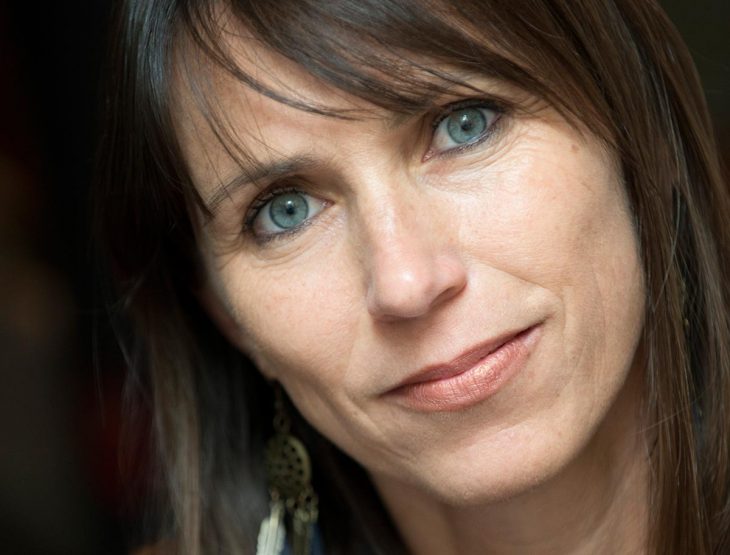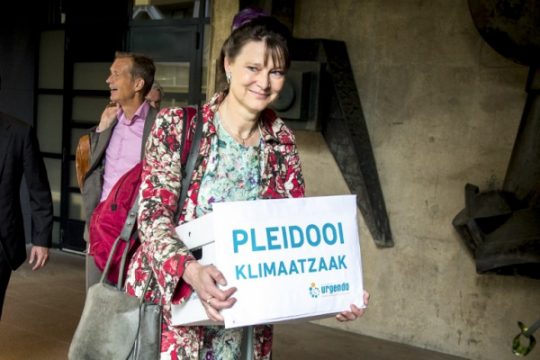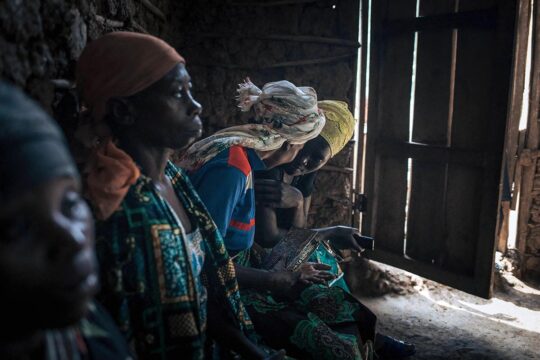JUSTICEINFO.NET IN-DEPTH INTERVIEWS
Valérie Cabanes
International lawyer, defender of human rights and nature
Lawyer and activist Valérie Cabanes has seen situations on all the world’s continents where people’s fundamental rights are being undermined by harm to their natural environment. Here she describes some of these situations, analyses recent environmental pressure on the International Criminal Court (ICC) and proposes an international legal structure putting as its priority the respect of the global ecosystem to restore security and peace.
JUSTICEINFO.NET: In your book “Un nouveau droit pour la Terre” - Le Seuil 2016 (Rights for Planet Earth, Natraj Publishers 2017), you propose that seriously damaging the environment be included as a crime in an expanded system of international criminal law. How did you come to that idea?
VALERIE CABANES: My experience is mainly in the humanitarian sector. In the 1990s, I worked as programme director for several NGOs on health and food security issues in Burkina Faso, Afghan refugees in Pakistan, handicapped peope in Uganda and social rehabilitation for women prostitutes in Cambodia. Then I studied international law and human rights so as to have more understanding of fundamental guarantees for the suffering people that I had met, and I led international programmes against human trafficking for six years. I then wanted to continue my studies by doing a law and anthropology thesis on an indigenous people, the Innu people of northern Quebec. They were confronted earlier this century with the construction of a big dam on the Romaine River, along which they live. In the course of my research I was able to attend their negotiations with the industrialists and see how they were being manipulated to hide the very harmful impact this project would have on the local ecosystem on which they depend. Given the situation, it was impossible for me to remain neutral, so I decided to stop doing my thesis and join their cause.
Having become aware of these issues, I also became active around 2010 for a similar situation: that of the Kayapo people who were facing the big Belo Monte dam project on Rio Xingu, in Brazil’s Pará state. There I realized the direct link that exists between major damage to a local ecosystem and human rights violations against a population that relies on it for survival.
I realized the direct link that exists between major damage to a local ecosystem and human rights violations against a population that relies on it for survival.
The Kayapo live by fishing. The Innu used the river as a highway to reach their hunting grounds. These people live as part of the ecosystem. If the movement of animals and people on the river is blocked, their survival is under threat. They can no longer live as they have done for thousands of years, their culture is destroyed – in a process that ethnologist Robert Jaulin calls “ethnocide” –, and there is a big spiritual impact. At Belo Monte, there has also been massive displacement of the population: 20,000 people living along the Rio Xingu were rehoused in buildings that cracked after three months. The social and environmental study by the construction company said this displacement was necessary. People were not forced, it was more or less formally accepted, but on the basis of false promises of jobs and quality housing. In addition, the Kayapo people had only three days to give an opinion on a 50,000-page study that had not even been translated into their language. This process was accompanied by the arrival of thousands of single men come to work on the dams, destabilizing the social fabric of these regions and fuelling sexual exploitation.
In October 2014, British lawyer Richard Rogers filed a communication on behalf of a group of victims with the Prosecutor of the International Criminal Court (ICC), claiming that a massive land grab by a "ruling elite" in Cambodia was taking place in order to develop real estate or agricultural activities, resulting in the destruction of millions of hectares of natural habitats that hundreds of thousands of Cambodians depend on for their livelihood. Those who resist are subjected to murder, forced population transfers, illegal imprisonment. According to the complaint, this amounts to a "widespread or systematic attack against the civilian population" constituting a crime against humanity. How do you view that?
The situation in Cambodia is changing if not the law then the practice of the ICC on environmental issues. In addition to the communication you mention, ICC Prosecutor Fatou Bensouda received a letter of support for victims signed by 40 international NGOs at the end of 2014. In 2017, Richard Rogers estimated that 850,000 people, or 5% of the Cambodian population, had been forced to move due to major agricultural, industrial or real estate projects. The phenomenon is so widespread that in her “policy paper on case selection and prioritisation” published in 2016, the Prosecutor announced her intention to investigate "the destruction of the environment, the illegal exploitation of natural resources or the illegal dispossession of land" in peacetime that potentially constitute crimes against humanity. This is a major step forward because, in the ICC's founding Rome Statute, damage to the natural environment is so far only mentioned in Article 8 defining war crimes.
Since early 2010 the ICC has been seized of these types of cases combining environmental destruction and human rights violations.
But this progress is not only due to the Cambodian situation. In fact, since early 2010 the ICC has been seized of these types of cases combining environmental destruction and human rights violations. An emblematic complaint was filed in October 2014 by an association representing 30,000 victims of pollution caused by oil exploitation that Texaco (now merged with Chevron) carried out in Ecuador's Amazonian forest between 1964 and 1990. As well as destroying their environment, the victims also pointed to massive humanitarian consequences (premature deaths, diseases) that they still suffer today, calling this an "attack on the civilian population of the Ecuadorian Amazon, carried out in full knowledge of the facts" by the company's managers who, at the time, were informed of the environmental and health impact of their activity.
In March 2015, the ICC announced that it could not take up the case because, whilst the consequences are ongoing, the acts causing the pollution happened before July 2002 and were therefore outside the court’s jurisdiction. The ICC spokesperson said at the time that the court could only consider environmental crimes if they were part of one of the four crimes in its mandate: genocide, crimes against humanity, war crimes or aggression. Meanwhile, after a long civil case lasting nearly 25 years, Ecuadorian courts ordered Chevron to pay $9.5 billion to repair the destroyed ecosystems and compensate the affected population. But in September 2018 the Permanent Court of Arbitration in The Hague, acting as arbitrator between Ecuador and Chevron, overruled this decision.
In this destruction of environments where people live, you seem to be blaming economic actors rather than political leaders…
I am saying above all that the ICC has not so far given sustained attention to the economic responsibilities involved in serious violations of human rights. Not even in the Cambodia situation where, whilst ruling elites seek to enrich themselves, multinational companies are involved and are at least exerting pressure to get construction markets from these elites. But as the case of Chevron in Ecuador shows, the victims of environmental destruction by businesses have few jurisdictions they can turn to in order to get the crime recognized, even less to get sanctions and reparations. The channels of recourse are actually tending to become less. Since the turn of the century, the multinationals have increasingly taken refuge behind private arbitration tribunals which, when faced with States calling for responsibilities to be established, tend to issue decisions that are favourable to the companies [see Frank Mulder, Eva Schram and Adriana Homolova, Les hommes derrière l’ISDS et leur vision du monde , multinationales.org, 14 March 2016].
The victims of environmental destruction by businesses have few jurisdictions they can turn to in order to get the crime recognized.
In recent years there has been a treaty under negotiation at the UN to regulate the activities of multinational companies with regard to human rights. There are also European decisions on the liability of European companies for serious human rights violations in third countries, and a French law on the duty of vigilance of parent companies towards their subsidiaries or subcontractors established abroad. But under international law, a chain of criminal liability has yet to be established for companies. At the top of such a chain a company director could say to his shareholders demanding profitability: "No, I cannot overexploit natural resources to the point of destroying the vital environment of an entire population. I do not have the right, and criminal liability prevents me from doing that.”
You seem to be saying that destroying natural habitats can be legally categorized as a serious violation of human rights. But that is far from the case today…
Indeed, this is lacking and yet there is a scientific basis on which to request this categorization. That is the theoretical framework of "planetary boundaries", established in 2009 by a team of 26 researchers under the direction of Johan Rockström of Sweden and Will Steffen of Australia, then in charge of the Stockholm Resilience Center and the International Geosphere-Biosphere Programme (IGPB) respectively. The "planetary boundaries" define nine processes that together regulate the stability of the Earth's ecosystem: biological diversity, climate, acidity levels in the ocean, forests, nitrogen and phosphorus in soils and oceans, fresh water quantity, stratospheric ozone layer, atmospheric composition and the overall good state of the food chain.
For each of these nine parameters, there is a limit not to be exceeded in order not to threaten the living conditions on which our societies depend. These parameters have been fairly stable over the past 10,000 years but have been disrupted since the emergence of the industrial revolution and the consumer society. Today, four of these nine thresholds have already been exceeded: the concentration of CO2 in the atmosphere has reached 411 ppm [parts per million] for a maximum threshold of 350 ppm; biodiversity erosion affects 100 species per year for a maximum threshold of 10 species per year, etc.
Rockström and Steffen explain that these "planetary boundaries" are interconnected, that exceeding one of them has consequences for the others, and that crossing all of them would lead us to a "tipping point" characterized, in the end, by a process of extinction of countless species and a massive threat to human life on Earth. Ban Ki-moon, when he was UN Secretary General, called for these planetary boundaries to be made part of the 17 Sustainable Development Goals adopted by the UN in September 2015.
Based on this scientific framework of ‘‘planetary boundaries’’, it is justified to ask that the ICC recognize a fifth international crime of ecocide.
Based on this scientific framework, it is easy to show that the destruction of a natural environment in one part of the planet has, beyond its local humanitarian implications, dramatic consequences for the Earth's entire ecosystem and therefore for all humans. This justifies asking, as British lawyer Polly Higgins has been doing since 2010 and as I have done since 2014 on the basis of a proposal drafted with other lawyers in the End Ecocide on Earth movement, for the inclusion of a fifth crime of "ecocide" in the body of international crimes recognized by the ICC. Exceeding planetary boundaries is a serious threat to human security and peace. To be precise, Polly Higgins defines ecocide as environmental damage that is widespread (several hundred square kilometres), long-term (several months) and severe (causing significant damage to human life, natural and economic resources). We propose, based on the theory of planetary boundaries, that it be characterized by “severe damage to any part or system of the global commons, or an Earth's ecological system”.
Do you have some examples ?
In a globalized economy that over-exploits natural resources, recent examples of ecocide, are unfortunately many. It has been proven that the Fukushima nuclear disaster in 2011 would not have occurred if the leaders of [Japanese electricity company] Tepco had followed the recommendations of a report recommending construction of a sufficiently strong perimeter wall at least 15 metres high - instead of the ten-metre wall that surrounded the plant at the time of the tsunami. Similarly, several years before the rupture of the Bento Rodrigues dams on Rio Doce, Brazil, in November 2015, the managers of mining company Samarco (a subsidiary of multinationals Vale and BHP Billiton) had been alerted several times by employees and outside experts about critical cracks that were appearing in the structure. In both cases, the pollution generated spread over several thousand square kilometres on the land, making it infertile for at least several decades, before discharging into the ocean. Locally, only twenty people died on the banks of the Rio Doce. But a leader of the Krenak people living along the Rio Doce, said: "The Rio Doce was killed, our culture was killed."
In a globalized economy that over-exploits natural resources, recent examples of ecocide, are unfortunately many.
And globally, the environmental and health consequences are endless. I and my colleagues at End Ecocide on Earth are calling for Article 30 of the Rome Statute to be made more flexible so that the condition of intent to commit a crime be less strict and that knowledge of the crime, mentioned in its paragraph 2, may prevail in this type of case. Knowledge, within the meaning of this Article, is when a person is aware that a circumstance exists or that a consequence will occur in the normal course of events.
Twenty deaths from negligence, can that be called a grave violation of human rights?
Although only 20 people died in November 2015 in the torrent of toxic iron mining sludge when the dam broke, how many people had to leave their homes without hope of return? How many premature deaths will occur as a result of the widespread pollution in this region? What part does this ecocide play in global environmental degradation, whose victims now number millions each year from air pollution, violent weather phenomena or cancers linked to the ingestion of toxic materials? That is why we are also proposing that international criminal law should now explicitly protect future generations -- for example Ecuadorian children born to poverty or sick parents because of Texaco oil pollution in the Amazon, or children born deformed from the spread of Agent Orange by the US military in Vietnam, and who have no jurisdiction to turn to.
It is not just a matter of sanctions and reparations. Above all, it is now necessary to legally prevent these crimes, which affect both nature and human beings.
But it is not just a matter of sanctions and reparations. Above all, it is now necessary to legally prevent these crimes, which affect both nature and human beings. One way of doing this at national level could be to recognize natural ecosystems such as rivers or forests as legal entities with human guardians - indigenous peoples living along a river, for example -, who would be responsible for representing them legally. And, at the international level, raising planetary boundaries to the level of binding standards on which a judge could determine whether an economic activity is detrimental to global security and the safety of the planet or not. Ideally, this could be done in advance in a preventive way, by imposing protective restrictions on an industrial project, for example. Or at worst, after the fact, criminal punishment.
A focus on economic responsibilities, introducing the planetary boundaries as a binding legal norm, the ICC recognizing ecocide and so on... What you advocate is becoming clearer at a time when, paradoxically, victims and responsibilities in this damage we are talking about are becoming less clear. In your opinion, are the recent climate claims against the State in the Netherlands or France a way of legally addressing these diffuse responsibilities?
Absolutely, but with two facts to keep in mind. Firstly, a State has a duty to protect its population, and that is one of its primary sovereign duties. This is one of the main arguments that Dutch foundation Urgenda used, in a country historically threatened by floods, to get an order against the Dutch government in June 2015 that it should implement policies to cut the country’s greenhouse gas emissions by at least 25% in 2020 compared with 1990 levels. Secondly, especially in rich and highly CO2-emitting countries, the State often has an important economic role to play both as investor and regulator, as well as funder of subsidies. Its decisions have a major impact on greenhouse gas emissions.
In a democracy, we can hope that this citizens' engagement for the climate will herald changes in the law to reconcile nature and human beings, or that law be introduced recognizing the principle of interdependence between them.
In 2015, the International Monetary Fund reported that $5.3 trillion in subsidies, equivalent to more than twice the GDP of France, had been allocated to fossil fuels around the world, through governments or banks. To legally attack these policies is to attack ecocidal policies. But I cannot speak objectively about the French complaint because I am a founder member of one of the four associations that filed it: Notre Affaire à Tous, which initiated the appeal. I can only note its public success - 2 million signatures of support to date. I also note that such actions are now on the increase, with more than 900 climate-related lawsuits filed against public actors around the world. In a democracy, we can hope that this citizens' engagement for the climate will herald changes in the law to reconcile nature and human beings, or that law be introduced recognizing the principle of interdependence between them.
Interviewed by Benjamin Bibas / La fabrique documentaire.







